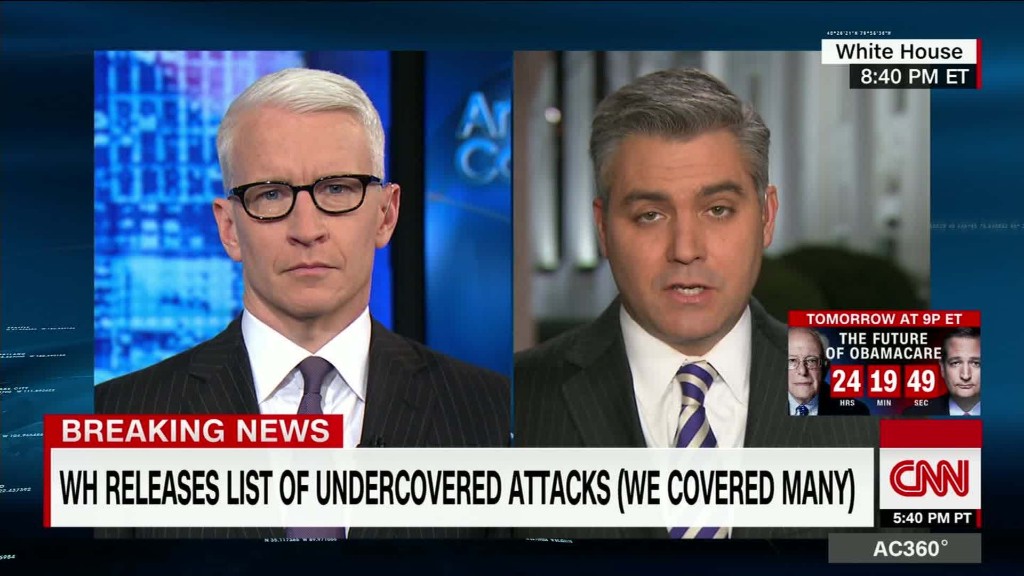
Was President Trump's declaration that the media is deliberately not covering terror attacks in Europe another example of his off-the-cuff, fact-free pronouncements? Or more evidence that he and his team understand how to exploit the press?
Maybe it's both.
The White House has been losing the public relations fight over its ban on travelers from seven Muslim-majority countries since the weekend of its chaotic implementation. It will keep losing that fight so long as the story of the ban is 5-year-old refugees trapped in war-ravaged Syria; translators who worked for years alongside American soldiers, risked their lives for them, and are now shut out of the United States; and families torn apart.
But if the story changes, if it instead becomes a debate over acts of terror perpetrated by Muslims, then the White House will be fighting on its preferred ground, and it will have a chance of victory. Never mind that none of the attacks cited in a long list released by the White House would have been prevented by Trump's ban.
Trump and his team have now moved the debate in that direction.
Related: Journalists call out White House claims on terror reporting
On Monday, during a speech to U.S. Central Command, Trump went off his prepared address and told the military leaders in the room, "Radical Islamic terrorists are determined to strike our homeland, as they did on 9/11, as they did from Boston to Orlando to San Bernardino and all across Europe. You've seen what happened in Paris and Nice. All over Europe it's happening. It's gotten to a point where it's not even being reported. And in many cases, the very, very dishonest press doesn't want to report it. They have their reasons, and you understand that."
Pressed by reporters to explain how Trump could have said something so obviously untrue, and to provide evidence for his claim, the White House took a few hours and then produced a list of attacks.
What the White House ultimately delivered was not an inventory of attacks that were, as Trump put it, "not even being reported." Instead, according to a White House official, it was a compendium of attacks that "have not received the media attention they deserved."
Really, it was a list of practically every terror attack committed by a Muslim in the United States or Europe in roughly the last two years, and it was obviously slapped together. Some facts were wrong; the word "attacker" was misspelled throughout, as was San Bernardino.
Moreover, as CNN's Anderson Cooper and Jim Acosta noted on "Anderson Cooper 360" on Monday night, the list -- 78 attacks in all since September 2014 -- included some that were clearly heavily covered at the time.
Cooper pointed out that he personally went to the site of several of the attacks, first mentioning one in Ottawa, Canada, and then saying, "I was also in Orlando last June -- that was on the list also -- after 49 people were gunned down at the Pulse nightclub. December 2015, that was also on the list, San Bernardino -- I was there. Fourteen people killed and 21 wounded in coordinated attacks. This was just a month after I reported on the carnage in Paris, where terrorists killed 130 people and wounded a hundred more in a series of attacks across the city."
Cooper was of course right, and the White House wrong: CNN and other outlets covered these attacks extensively. But in pointing out how wrong the White House is, the media may be doing it a favor.
News outlets are bringing up these attacks to show that they were covered extensively, but they are also reminding their audiences that 49 people were killed at the Pulse nightclub, that 14 people were killed in San Bernardino, that the San Bernardino attack happened only a month after 130 people were killed in Paris.
There is a body of academic work that suggests a "backfire effect" to this kind of debunking. In pointing out that a claim is false, we must first repeat the claim, and we may inadvertently reinforce it. This might not have been the Trump team's strategy initially, but they may benefit from it nonetheless.
The idea Trump was driving at has been circulating in parts of the right-wing media for years. It is not so much that the media doesn't cover attacks, but that it doesn't cover them in an alarmist, or just plain Islamophobic, way. It is similar to the criticism of President Barack Obama's ISIS strategy, which Trump picked up and amplified: You can bomb them if you want, but you can't defeat them unless you accept, and say aloud, the words "radical Islamic terrorism."
In part because this is not a debate settled by objective fact -- how do you determine objectively whether a terror attack has been covered enough? -- the media and the Trump team have two different objectives.
The media is dealing with the truth: We have covered these stories. What the White House is promoting is something else: a feeling, a dark one, and definitely not a fact.


